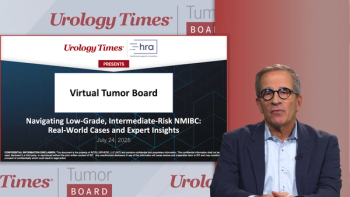Articles by Katie S. Murray, DO, MS

Panelists discuss how patients with early recurrent low-grade bladder cancer, especially those on an anticoagulant or with multiple risk factors, represent ideal candidates for ablative therapy with UGN-102 to break the cycle of repeated transurethral resection of bladder tumors (TURBTs) and provide a paradigm shift from purely surgical management to shared decision-making between surgical and medical treatment options.

Panelists discuss how patients with recurrent low-grade bladder cancer, particularly women who may face additional anatomical challenges during transurethral resection of bladder tumor (TURBT) procedures, can benefit from UGN-102 as an alternative to repetitive surgical resections, addressing the TURBT treadmill phenomenon where patients undergo multiple procedures with diminishing returns.

Panelists discuss how UGN-102, a reverse thermal hydrogel formulation of mitomycin, offers an FDA-approved ablative treatment option for patients with intermediate-risk non-muscle invasive bladder cancer (NMIBC), demonstrating 80% complete response rates in the ENVISION trial (NCT05243550) and allowing for the de-escalation of surveillance and reduced surgical burden.

Case 3: A 49-Year-Old Man With Recurrent Non–Muscle-Invasive Bladder Cancer
ByAshish Kamat, MD, MBBS ,Sam S. Chang, MD, MBA,Bogdana Schmidt, MD, MPH,Katie S. Murray, DO, MS Panelists discuss how to approach treatment for a younger (49-year-old) male veteran with bladder cancer, focusing on the rising rates among veterans, challenges with recurrent disease despite BCG therapy, various second- and third-line treatment options, including gemcitabine-docetaxel combination therapy and the importance of thorough monitoring for disease progression.

Case 2: A 68-Year-Old Woman With Non–Muscle-Invasive Bladder Cancer
ByAshish Kamat, MD, MBBS ,Sam S. Chang, MD, MBA,Bogdana Schmidt, MD, MPH,Katie S. Murray, DO, MS Panelists discuss how to manage the treatment of a 68-year-old woman with painless intermittent hematuria and positive cytology for high-grade urothelial cancer, addressing gender differences in diagnosis timing, the importance of repeat transurethral resection (TURBT) procedures, BCG therapy options, and considerations for radical cystectomy with pelvic organ preservation when BCG fails.

Case 1: A 79-Year-Old Man With Non–Muscle-Invasive Bladder Cancer
ByAshish Kamat, MD, MBBS ,Sam S. Chang, MD, MBA,Bogdana Schmidt, MD, MPH,Katie S. Murray, DO, MS Panelists discuss how they approach a typical bladder cancer case of a 79-year-old man with hematuria, including initial diagnostic procedures, the importance of proper tumor measurement during resection, BCG therapy protocols, and management options for BCG-unresponsive disease with a focus on nadofaragene firadenovec (Adstiladrin).

Non–Muscle Invasive-Bladder Cancer Overview
ByAshish Kamat, MD, MBBS ,Sam S. Chang, MD, MBA,Bogdana Schmidt, MD, MPH,Katie S. Murray, DO, MS Panelists discuss how non–muscle-invasive bladder cancer (NMIBC) is staged, graded, and treated according to risk stratification, with detailed explanations of low-, intermediate-, and high-risk categories and corresponding treatment pathways.

Panelists discuss the impact of long-term care in patients with non–muscle-invasive bladder cancer (NMIBC), considering the unique needs of specific patient groups and highlighting advancements in NMIBC treatment that may support better care experiences for patients.

Panelists discuss the impact of long-term care in patients with non–muscle-invasive bladder cancer (NMIBC), considering the unique needs of specific patient groups and highlighting advancements in NMIBC treatment that may support better care experiences for patients.

Katie S. Murray, DO, offers advice to urologists considering the adoption of newer treatment modalities for BCG-unresponsive non–muscle-invasive bladder cancer (NMIBC), encouraging them to integrate these therapies into practice in light of the positive clinical trial data while emphasizing the potential for improved patient outcomes and the importance of staying informed about evolving treatment options.

Katie S. Murray, DO, discusses the promising clinical trial data showing that over 50% of patients with BCG-unresponsive non–muscle-invasive bladder cancer (NMIBC) experience a complete response after 3 months of treatment, comparing these outcomes with her own clinical experience, and highlights the importance of long-term follow-up to assess the durability of response in patients receiving newer therapies.

Katie S. Murray, DO, emphasizes the importance of administering newer treatments for BCG-unresponsive non–muscle-invasive bladder cancer (NMIBC) locally by urologists, which helps reduce the overall burden on patients, minimizes systemic adverse effects, and eliminates the need for travel to specialized oncology centers, while also recommending strategies to encourage health care providers to adopt these treatments, including education on clinical trial data and real-world efficacy.

Katie S. Murray, DO, discusses how the introduction of targeted gene therapies has shifted the approach to managing BCG-unresponsive non–muscle-invasive bladder cancer (NMIBC), offering more personalized treatment options, and explains how the ease of administration—without the need for specialized equipment like biosafety hoods—reduces logistical burdens on clinics.

Katie S. Murray, DO, reviews the standard treatment options for BCG-unresponsive non–muscle-invasive bladder cancer (NMIBC), including intravesical chemotherapy, PD-L1 inhibitors, and other immunotherapeutic agents while highlighting the limitations of these therapies, such as incomplete response rates and potential adverse effects.

Katie S. Murray, DO, discusses why some patients do not respond to BCG therapy, exploring factors such as tumor biology and immune system dysfunction, and how this impacts their prognosis, while also addressing the challenges and unmet needs in treating these patients, including the current BCG shortages and how it is reshaping treatment approaches.

Katie S. Murray, DO, provides an overview of BCG-unresponsive non–muscle-invasive bladder cancer (NMIBC), defining it as a form of bladder cancer that does not respond to BCG therapy and explaining how it differs from BCG-responsive NMIBC in terms of treatment outcomes and disease progression.

"On-going innovation will continue to drive UTUC management forward, and with it will come on-going challenges of how to best study a relatively rare disease," write the authors.

A recent human study sought to replicate previous success seen in animal models of reperfusion injury, reports Urology Times SUO internship program member Katie Murray, DO.

Urology Times SUO internship program member Katie Murray, DO, reports on a study evaluating the differences in urine cytology and UroVysion FISH testing results among clinically meaningful patient subgroups.








